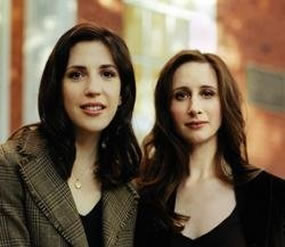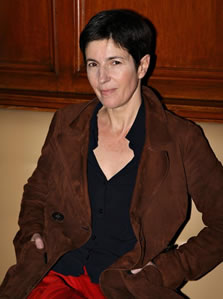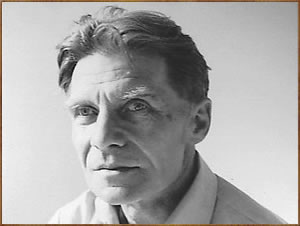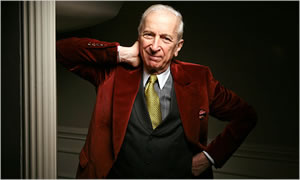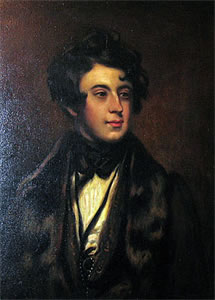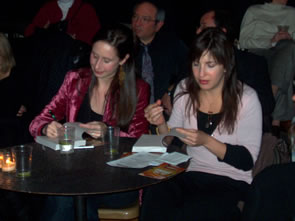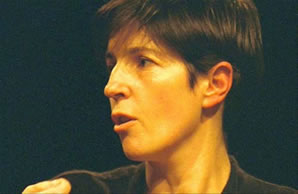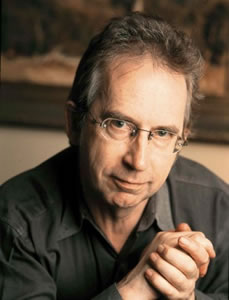Dolce far niente

Slaaploze nacht door Nikolaj Romadin, z.j.
Slaapdagboek
Slaapadvies 1 tot en met 5:
Verwijder wekkers.
Maak de avond rond en elke handeling een bocht op weg naar slaap.
Creëer gewoontes, simpel als een glas water.
Draag een pyjama om het lijf te overtuigen van de nacht.
Denk als je wakker ligt niet: ik lig wakker. Denk: ik lig en dat is het begin van slapen.
Maar dit begin ligt gekanteld, vier poten en de blik omhoog, als een schaap niet in staat zichzelf te draaien. De nacht heeft in- en uitgeademd, op de wekker die ik wegdeed hebben de wijzers zestiggraden afgelegd, gradaties donker trokken door de kamer tot nu, de meest doorlaatbare, nautische schemer: al urenlang verandert alles, maar niet dit begin — of hoe moet ik het noemen? Een zeef tussen binnen en buiten. Het wiegen van een tak in en uit de schaduw. Dit schommelend in tweeën liggen: half verdwenen, half aanwezig.
Slaapadvies 6: De pijnappelklier, de pit in de hersens die donker meet en doet versuffen kan gebaat zijn met een dosis extra melatonine.
In afwachting van de werking google ik de klier, de pit. De zetel van de ziel, schrijft Descartes, ter grootte van een erwt. Een kogelrond vissenoog dat open en glazig mijn brein verkent; schaamte, klein conflict, wie te bellen, wat te zeggen, wat recht moet, ongedaan gemaakt, het overzichtelijk leed dat leven heet en zich ’s nachts tot rozenkrans rijgt. Het oog schiet erlangs, kraal voor kraal, razendsnel, een waanzinnige erwt, een neurotische non in gebed. Als dit een zetel is, dan een wankele, mijn ziel tot wandelen gedoemd.
Slaapadvies 7: Een bed is groter dan een bed. Het is het hele huis dat je toedekt, inclusief zijn mensen. Ken het ritme van wie naast je ligt.
Maar ik vind geen ritme of het moet het ritme zijn van een ruïne, een langzaam overwoekerd worden. Van zijn lichaam losgeknoopt ligt wie naast mij ligt geduldig te vergaan tot open plek. Wie weet waar hij nu wakker is, met wie zijn geest versmelt. In zijn adem hoor ik geroezemoes van nachtelijk bezoek terwijl ik gesloten op de veren lig.
Slaapadvies 8 tot en met 31:
Vermijd licht. Verduister. Oefen.
Eet bananen. Eet geen fruit.
Zoek het licht op. Drink warme melk.
Kies een houding waarin slaap je overvalt.
Sta op. Val af. Open ramen.
Trek sokken aan. Sokken uit. Vermijd melk. Adem. Handen naast je.
Pieker niet. Lees. Wandel. Lig stil.
Praat. Tel. Vergeet.
Onthaal de slaap.
Achter me een trage voetstap, een paard, in het laatste donker opgedoemd, dat mij volgt, het hoofd een zware engel in mijn nek. Ik verberg me in de manen, val uit mijn wervels, gered. Ik aai, klop, juich maar vergeet het paard te voeren, het loopt doodkalm van mij weg.
Slaapadvies 32:
Becijfer, om grip te krijgen, je slaap van een tot tien.
De laatste tram.
Een dronken galm.
De hese stem van het meisje bij de buren op tv.
Negen, acht.
Het rolluik van de avondwinkel. Zeven.
Laag voor laag afgepeld. Zes, vijf vier, tot dit bangste dier

Marjolijn van Heemstra (Amsterdam, 10 februari 1981)
Amsterdam bij nacht
De Vlaamse schrijver en dichter Willem Elsschot werd in Antwerpen geboren op 7 mei 1882. Zie ook alle tags voor Willem Elschot op dit blog.
Uit: Villa des Roses
‘Pension de famille de premier ord re’ was wel een beetje overdreven. Wat het ‘confort moderne’ betreft, dat bestond voornamelijk hierin, dat men dadelijk een huissleutel kreeg en dus ook bij nacht vrij gaan en komen kon zonder iemand te moeten opbellen. Elektrische verlichting en een badgelegenheid daarentegen, hield men er niet op na. Werd er al eens naar gevraagd door een nieuweling die zich na een week of zo onrein begon te gevoelen, of door een die er alles van weten wilde voor hij begon, dan maakte madame Brulot hem duidelijk dat zij van beide nieuwigheden afgezien had wegens het daaraan verbonden gevaar. Het afbranden van de Bazar de la Charité, waarbij een paar honderd mensen het leven verloren, was volgens madame Brulot veroorzaakt door kortsluiting in de elektrische geleiding, en schuin over de Villa was er eens een deurwaarder van nog geen veertig jaar in zijn bad gestikt, zonder dat de buren ook maar één kreet vernomen hadden. Door `déjeuners et diners au cachet’ werd bedoeld dat men ook ’s middags of ’s avonds kon komen eten zonder dat men in de Villa zijn intrek behoefde te nemen, waardoor het aantal monden nogal afwisselde. Het ‘English spoken’ dagtekende uit een tijd toen er onder de kostgangers der Villa een heer was, die in Londen had gewoond en daarom opsneed met zijn Engels. Nog steeds kende madame Brulot een woord of vijf zoals yes, no, money, room en dinner. Laat ons Caesar geven wat hem toekomt. Het dient ter ere van madame Brulot gezegd dat het eten, een paar artikelen van ondergeschikt belang en dan die eieren terzijde gelaten. heus zo slecht niet was. De grondstoffen kocht zij in eigen persoon en het toebereiden ervan werd overgelaten aan de zorgen van een keukenmeid. bijgestaan door een kamermeisje, dat gewoonlijk ook net iets van koken afwist. De spijzen. althans die welke genuttigd werden op de twee grote gemeenschappelijke maaltijden. welke respectievelijk ’s middags om twaalf en ’s avoinds om zeven uur aanvingen, waren voor alle kostgangers dezelfde. Maar toch werden zeer uiteenlopende prijzen betaald. Hierop hadden verscheidene factoren een meer of minder overwegende invloed, en wel in de eerste plaats de grootte, ligging en meubilering der kamer welke men betrok, de hoeveelheid voedsel welke men gebruikte, de financiele reputatie van het land waar men vandaan kwam (Amerikanen bijvoorbeeld betaalden in de regel meer dan Polen of Armeniers) eindelijk de gezondheid en de ouderdom der kostgangers in verband met de meer of mindere last door ieder van hen veroorzaakt. Men werd dan ook nooit anders dan op proef aangenomen, hetzij voor een week, hetzij voor een maand, al naar gelang van de indruk die men hij het eerste onderhoud op madame Brulot maakte, waarbij ook rekening gehouden werd met het gewicht en de kubiekinhoud van het meegebrachte reisgoed. Dit laatste was echter hij de beoordeling gaandeweg minder overwegend geworden, sedert madame Brulot allertreurigste ondervindingen opgedaan had met een paar reusachtige koffers. Madame Brulot beoordeelde haar nieuwelingen nog dikwijls zeer verkeerd, al had zij tijd genoeg gehad om zich in de loop der jaren te volmaken in een studie, welke toch rechtstreeks tot haar vak behoorde. Zo kon zij zich niet geheel losmaken an het vooroordeel, dat dikke mensen altijd veel en magere gewoonlijk weinig spijs en drank gebruiken, zonder te bedenken dat zwaarlijvigen dikwijls matigheid moeten betrachten, terwijl magere kerels vaak met een lintworm rondlopen, wat natuurlijk een ramp is voor een kosthuis.”

Willem Elsschot (7 mei 1882 – 31 mei 1960)
Cover DVD
De Spaanse schrijfster Almudena Grandes Hernández werd geboren op 7 mei 1960 in Madrid. Zie ook alle tags voor Almudena Grandes op dit blog.
Uit: De vijand van mijn vader (Vertaald door Mia Buursma)
“Dat was waar, maar ook niet waar. Ze was geboren aan zee, in een buurtschapje van vissers, zo dicht bij Almería dat het haast een buitenwijk van de stad leek. Daar was het nooit koud. Dat wist ik omdat haar jongste zus begin maart was getrouwd en ons had uitgenodigd voor de trouwerij. Aanvankelijk had het bericht weinig indruk op mij gemaakt, want we hadden wel vaker dergelijke uitnodigingen gekregen en daar was nooit iets mee gebeurd, maar die keer was anders dan anders. Ten eerste omdat mijn moeder had besloten ernaartoe te gaan, om weer terug te gaan naar haar dorp waar ze meer dan tien jaar niet was geweest. En ook omdat ze had besloten ons mee te nemen. In 1947 was die reis een enorme gebeurtenis voor elke familie in de Sierra Sur.
‘En waarom gaat papa niet mee?’ durfde ik te vragen toen we al in de streekbus zaten die ons van Fuensanta naar Martos zou brengen, terwijl ik door het raampje naar hem keek en zag hoe hij ons op de stoep stond uit te zwaaien.
‘Daarom niet.’
‘Maar waarom niet?’
‘Omdat hij niet kan.’
‘Moet hij werken?’
‘Ja, natuurlijk.’
Die ochtend was mijn dorp ontwaakt onder een dun laagje sneeuw. In Martos was de sneeuw niet blijven liggen, maar het was er wel heel koud. Dat weet ik nog, omdat de bus ons met ruim twintig minuten vertraging afzette bij het station en we naar de trein moesten rennen, maar ondanks het geren, het gezweet en het gedoe met de koffers met de cadeaus voor de bruid en haar familie kregen we het maar niet warm.
Moeder dreef ons voort als een stel schapen, terwijl ze met een getypt vel papier in haar hand door de gangpaden liep, op zoek naar de twee leden van de Guardia Civil die meereisden in de trein. Ik zat voor het eerst zonder mijn vader in een trein, en hoewel ik probeerde net te doen of alles heel gewoon was omdat ik, doordat hij niet meeging, de enige man van de familie was, was ik voor alles bang. Als hij erbij was, was het anders. Als hij vooropging in zijn uniform, met zijn driekante steek en zijn dienstwapen, gingen de reizigers voor ons opzij, en in plaats van ons naar onze kaartjes te vragen, haastten de conducteurs zich om zo nodig iemand op te laten staan zodat we allemaal bij elkaar konden zitten, maar deze keer ging mijn vader niet mee, en ik vertrouwde niet helemaal op de twee getypte vellen papier die hij ons in een envelop had meegegeven toen hij bij het portier van de streekbus afscheid van ons nam.”

Almudena Grandes (Madrid, 7 mei 1960 )
De Australische schrijver Peter Carey werd geboren op 7 mei 1943 in Bacchus Marsh (Victoria). Zie ook alle tags voor Peter Carey dit blog.
Uit: Amnesia
“It was a spring evening in Washington DC; a chilly autumn morning in Melbourne; it was exactly 22:00 Greenwich Mean Time when a worm entered the computerised control systems of countless Australian prisons and released the locks in many other places of incarceration, some of which the hacker could not have known existed. Because Australian prison security was, in the year 2010, mostly designed and sold by American corporations the worm immediately infected 117 US federal correctional facilities, 1700 prisons, and over 3000 county jails. Wherever it went, it travelled underground, in darkness, like a bushfire burning in the roots of trees. Reaching its destinations it announced itself: THE CORPORATION IS UNDER OUR CONTROL. THE ANGEL DECLARES YOU FREE.
This message and others more elaborate were read, in English, by warders in Texas, contractors in Afghanistan, Kurdistan, in immigrant detention camps in Australia, in Woomera, black sites in the Kimberley, secret centres of rendition at the American “signals facility” near Alice Springs. Sometimes prisoners escaped. Sometimes they were shot and killed. Bewildered Afghans and Filipinos, an Indonesian teenager wounded by gunfire, a British Muslim dying of dehydration, all these previously unknown individuals were seen on public television, wandering on outback roads.
The security monitors in Sydney’s Villawood facility read: THE ANGEL OF THE LORD BY NIGHT OPENED THE PRISON DOORS, AND BROUGHT THEM FORTH. My former colleagues asked, what does this language tell us about the perpetrator?
I didn’t give a toss. I was grateful for a story big enough to push me off the front pages where I had already suffered PANTS ON FIRE. I was spending my days in the Supreme Court of New South Wales paying Nigel Willis QC $500 an hour so I could be sued for defamation. Nigel’s “billable hours” continued to accrue well past the stage when it became clear that he was a fuckwit and I didn’t have a chance in hell, but cheer up mate: he was betting 3:2 on a successful appeal. That my barrister also owned a racehorse was not the point.”

De Engelse dichter en schrijver Robert Browning werd geboren op 7 mei 1812 in Londen. Zie ook alle tags voor Robert Browning op dit blog.
Childe Roland To The Dark Tower Came
VIII
So, quiet as despair, I turn’d from him,
That hateful cripple, out of his highway
Into the path the pointed. All the day
Had been a dreary one at best, and dim
Was settling to its close, yet shot one grim
Red leer to see the plain catch its estray.
IX
For mark! no sooner was I fairly found
Pledged to the plain, after a pace or two,
Than, pausing to throw backward a last view
O’er the safe road, ’t was gone; gray plain all round:
Nothing but plain to the horizon’s bound.
I might go on; nought else remain’d to do.
X
So, on I went. I think I never saw
Such starv’d ignoble nature; nothing throve:
For flowers—as well expect a cedar grove!
But cockle, spurge, according to their law
Might propagate their kind, with none to awe,
You ’d think; a burr had been a treasure trove.
XI
No! penury, inertness and grimace,
In the strange sort, were the land’s portion. “See
Or shut your eyes,” said Nature peevishly,
“It nothing skills: I cannot help my case:
’T is the Last Judgment’s fire must cure this place,
Calcine its clods and set my prisoners free.”

Robert Browning (7 mei 1812 – 12 december 1889)
Portret door Pen Browning, 1882
Zie voor nog meer schrijvers van de 7e mei ook mijn blog van 7 mei 2018 en ook mijn blog van 7 mei 2017 deel 2.











